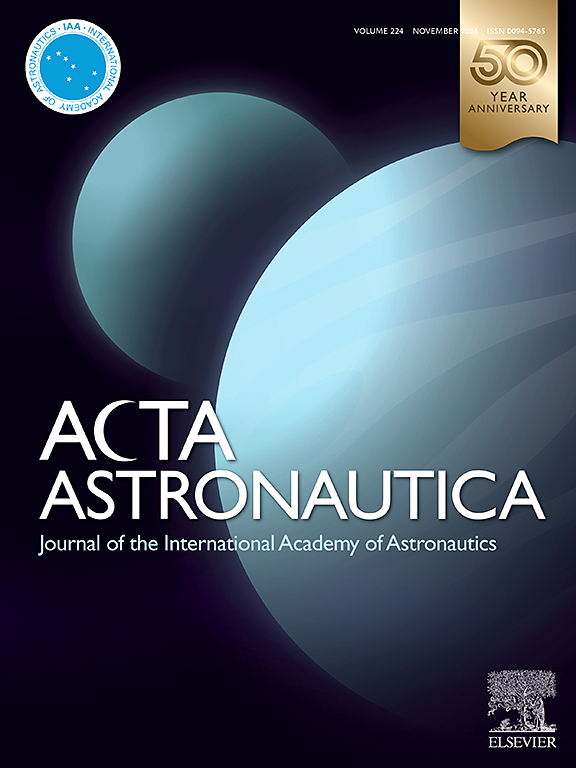国际空间站DCMIX4任务期间二元聚合物混合物在微重力条件下的质量输运特性分析与重力实验的比较
IF 3.4
2区 物理与天体物理
Q1 ENGINEERING, AEROSPACE
引用次数: 0
摘要
本文介绍了在国际空间站(ISS)上执行的DCMIX4任务在微重力条件下进行的热扩散实验结果。将空间数据与先前获得的地面测量数据进行比较。所研究的二元混合物由聚苯乙烯(4730 g/mol)溶于纯溶剂甲苯组成,在20-25-30-35℃四种不同的工作温度下进行分析。开发了一个完整的程序,详细说明了从数据采集到使用各种分析解决方案确定流体传输特性(Soret,分子扩散和热扩散系数)的每一步。Soret系数(稳态物种分离分析)的实验结果表明,随着温度的升高,Soret系数呈线性下降,这与地面热扩散实验结果非常吻合。相反,分子扩散系数(非稳态研究)随温度的升高呈增加趋势,与基于重力的结果偏差较大。这些变化是由于所采用的相位步进技术的局限性造成的相位重建的不准确性。本文章由计算机程序翻译,如有差异,请以英文原文为准。
Analysis of the mass transport properties of the binary polymeric mixture in microgravity conditions during the DCMIX4 campaign onboard the ISS. Comparison with gravity-based experiments
We present the results of thermodiffusion experiments conducted under microgravity conditions during the DCMIX4 mission performed onboard the International Space Station (ISS). The space data are compared to previously obtained ground-based measurements. The investigated binary mixture, composed of polystyrene (4730 g/mol) dissolved in the pure solvent toluene, was analysed at four different operating temperatures: 20-25-30-35 °C. A complete procedure was developed, detailing each step from data acquisition to the determination of the fluid transport properties (Soret, molecular diffusion, and thermodiffusion coefficients) using various analytical solutions. Experimental results for the Soret coefficient (steady-state species separation analysis) indicate a linear decrease with increasing temperature, which is in excellent agreement with the Soret coefficients obtained under ground-based thermodiffusion experiments. In contrast, the molecular diffusion coefficient (unsteady-state study) exhibits an increasing trend with temperature, presenting larger deviations from gravity-based results. These variations are attributed to inaccuracies in phase reconstruction because of limitations in the employed phase-stepping technique.
求助全文
通过发布文献求助,成功后即可免费获取论文全文。
去求助
来源期刊

Acta Astronautica
工程技术-工程:宇航
CiteScore
7.20
自引率
22.90%
发文量
599
审稿时长
53 days
期刊介绍:
Acta Astronautica is sponsored by the International Academy of Astronautics. Content is based on original contributions in all fields of basic, engineering, life and social space sciences and of space technology related to:
The peaceful scientific exploration of space,
Its exploitation for human welfare and progress,
Conception, design, development and operation of space-borne and Earth-based systems,
In addition to regular issues, the journal publishes selected proceedings of the annual International Astronautical Congress (IAC), transactions of the IAA and special issues on topics of current interest, such as microgravity, space station technology, geostationary orbits, and space economics. Other subject areas include satellite technology, space transportation and communications, space energy, power and propulsion, astrodynamics, extraterrestrial intelligence and Earth observations.
 求助内容:
求助内容: 应助结果提醒方式:
应助结果提醒方式:


